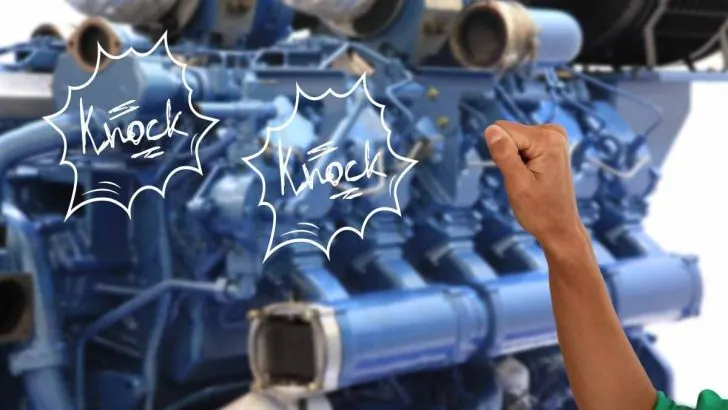One of the most characteristic indications that you’re driving a diesel engine is the knocking sound when you turn on the vehicle. This noise can be frightening if you’re not used to driving an internal combustion engine. You may be wondering what causes the diesel knock and if this noise means something needs to be fixed.
Here are 5 reasons diesel engines knock:
- Routine combustion
- An exhaust or valve leak
- Valve damage
- Broken bolts
- Injector problems (fuel knock)
Routine combustion is typical, but any of the other problems listed mean you need to get your car into a mechanic as soon as possible. Below, we will expand on what each of these issues means and how to know if it’s the case with your vehicle. Then, we will talk about the following steps to getting your vehicle fixed.
1. Routine Combustion
Diesel engines are known to knock more so than their other counterparts. The knock is partly because of a fundamental, normal engine combustion process.
You’ll notice that when you turn your diesel engine on, even if things are working perfectly, you may hear a revving and ticking sound for a few minutes until your engine settles. Especially when driving a big truck, you might hear the knocking sound more often.
Even though combustion might sound like a scary word, this is typical in vehicles. Air becomes compressed, and a spark ignites the air, causing combustion. This is not to be confused with a harmful, constant knocking in your car.
Uneven combustion can also cause the engine to knock, rupturing your combustion chamber. This is a common phenomenon that may also be referred to as “diesel knock” or “combustion roughness.” (source)
2. An Exhaust or Valve Leak
An exhaust or valve leak could be the cause of your diesel engine knocking.
This noise will sound less like the familiar knock of starting your engine but more of ticking or tapping inside of your diesel engine. It’ll be in addition to the regular knocking you hear when you start your car.
This video shows the process of YouTube mechanic Adept Ape finding an exhaust leak:
In the video, he looks at the valves and rollers to see any damage. A damaged, burned, dark exhaust valve, or any valve looking slightly different from the others, might indicate an exhaust or valve leak.
If you open up your hood and see that some of the valves are looking dirty or damaged, and the noise only increases from this part of the engine, you might have an exhaust or valve leak on your hands.
3. Valve Damage
Valve damage can indicate an exhaust or valve leak, but it doesn’t always. Sometimes, valve damage is simply damage to your valves, which can often cause constant noise coming from your engine (source).
The valve damage can be caused by a few things besides a leak, such as:
- Normal wear and tear.
- A need to replace based on your owner’s manual guidelines.
- Problems with cooling.
- Using the wrong fuel.
If you figure out that your knocking is caused by valve damage, you still have a bit more troubleshooting to do. You’ll need to figure out if this is caused by a leak, fuel lubrication issues, or faulty valves (source).
4. Broken Bolts
Broken bolts can also cause a knocking problem. This could happen if you were in your engine doing something and didn’t secure all of your bolts correctly or if someone else was working on your car and just didn’t get them tight enough.
You don’t need an excessive amount of car knowledge to understand this issue. If something is loose or broken, it will rattle or bang against the other items next to it as the car moves, causing a knock.
In addition to broken bolts, you may have an issue with other loose or damaged parts in your engine. This might be your rubber mounts, air filter, or outlet pipe. It’s a good idea to get under the hood and see if anything is loose, or you left something inside of the engine like a wrench or a screwdriver (source).
5. Injector Problems (Fuel Knock)
An injector problem could also cause the knocking sound, referred to above as a “diesel knock” or a “combustion roughness.” Usually, this isn’t too big of a problem, but if it’s constantly happening after the car has been idling for a bit, there might be something going on.
An injector problem might indicate that your spark isn’t igniting as it should, as explained in this video:
If caused by an injector or combustion issue, fuel knock can be detrimental to your car, so you should get this looked at right away.
Fixes for Diesel Knocking
First and foremost, you can prevent diesel knocking and issues from occurring by practicing preventative maintenance as your manual guides.
This means:
- Getting oil changes.
- Changing your air filter.
- Keep up with your fluids.
- Replacing parts when you get to a specific mileage.
- Ensuring that you use the best possible fuel grade for your vehicle.
As with most automotive things, a professional should be consulted before attempting any DIY fixes on your car.
Often, even when doing easy fixes to your vehicle, you run the risk of damaging some other part of your car and needing to do another fix. Cars have several moving parts and pieces connected, so the consequence of messing with one thing is that you may soon have to mess with another.
Typically, when you bring your car to a mechanic, they’ll let you know if the engine knocking you’re hearing is typical of your diesel engine or if it sounds like something else is going on.
This is such a common problem with diesel engines. There are dozens of YouTube videos online that will help you isolate the sound of your vehicle knocking and determine whether it’s something you need to bring to the attention of your mechanic or not.
This short one from Zanes Garage shows you how an engine knock looks and sounds like:
Based on the cause of your engine knock, whether it be loose bolts or valve damage, your mechanic will usually troubleshoot from there.
If it’s fuel knock or another injector issue, your mechanic may attempt to:
- Reduce cylinder pressure.
- Clean your combustion chamber.
- Reduce your intake charge density or temperature.
- Change your air-fuel mix.
Knowing when you are having a regular knock or a “something-is-damaged” knock can be difficult, so being extra observant of your vehicle when you know it’s running smoothly is essential.
Nine times out of ten, if you’re starting to notice the knocking, it’s because your vehicle is knocking a little differently today than it was yesterday. Your diesel vehicle will always have some knocking level, but noticing a difference might be your first indicator of something else.

